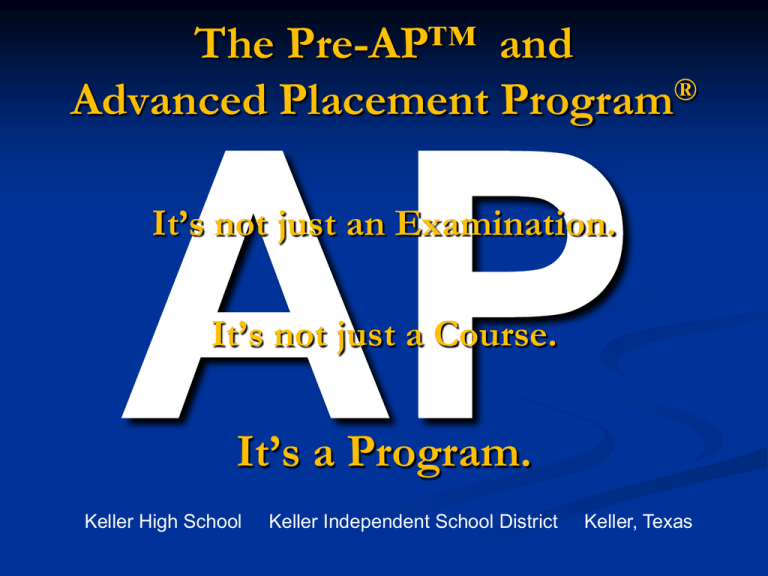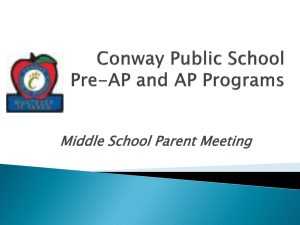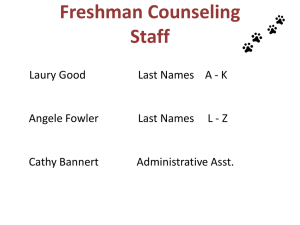PAP AP Experience Powerpoint HERE
advertisement

The Pre-AP™ and Advanced Placement Program® It’s not just an Examination. It’s not just a Course. It’s a Program. Keller High School Keller Independent School District Keller, Texas Goals for this Presentation Provide information that will assist parents and students in making decisions about high school course options. Apprise parents and students of the benefits of selecting the most challenging courses that the student can manage. Provide realistic expectations for students and parents on what to expect from Pre-AP/AP courses at Keller High Hear from KHS Students and Teachers about the PreAP/AP experience. What is Pre-AP? Pre-AP™ is a set of content-specific strategies, designed by College Board, to: build rigorous curricula promote access to AP® for all students introduce skills, concepts, and assessment methods to prepare students for success when they take AP and other challenging courses strengthen curriculum and increase the academic challenge for all students Classes offered in the KHS Pre-AP Program Algebra II Pre-AP Geometry Pre-AP Pre-Calculus Pre-AP English I Pre-AP English II Pre-AP Art I Pre-AP Art II Drawing, Painting, and Sculpture Pre-AP Art III Drawing, Painting, and Sculpture Pre-AP French I/II/III Pre-AP German I/II/III Pre-AP Spanish I/II/III Pre-AP Biology Pre-AP Chemistry Pre-AP Physics Pre-AP World Geography Pre-AP Computer Science Pre-AP The Advanced Placement Program The College Board’s Advanced Placement Program® offers motivated high school students the opportunity to take challenging college-level courses while in high school. These courses are taught by high school teachers, who utilize course descriptions developed by committees of university professors and experienced AP teachers. Each spring, students are offered the opportunity to demonstrate their knowledge and skills on subject specific AP Examinations. Successful completion of an AP Exam can result in college credit, advanced standing, or both, depending on the college or university a student chooses to attend. Classes offered in the KHS AP Program Calculus AB and BC Statistics English III (Language) English IV (Literature) World History US History Government Micro/Macro Economics Psychology Music Theory Biology Chemistry Physics B and C Environmental Science Computer Science Spanish Lang and Lit. French, German and Spanish IV Spanish V Art History Studio 2D and 3D Design AP Results at KHS 2008 2009 2010 2011 2012 KELLER HIGH Total AP Students 637 620 648 623 642 Number of Exams 1307 1271 1265 1201 1262 391 403 416 480 63.1% 62.2% 66.8% 74.8% 61.1% 60.2% 60.2% 61.5% AP Students with Scores 3+ 357 % of Total AP Students with Scores 3+ 56% GLOBAL % of Total AP Students with Scores 3+ 60.1% Benefits of the PAP/AP Program while in High School ★ Gain the edge in college preparation • • • ★ Stand out in the college admissions process • • • ★ Improve writing skills and sharpen problem-solving techniques. Develop the study habits necessary for tackling rigorous course work. Get a head start on exactly the sort of work you will confront in college. Demonstrate maturity and readiness for college. Show willingness to push yourself to the limit. Emphasize your commitment to academic excellence. Broaden your intellectual horizons • • Explore the world from a variety of perspectives, most importantly your own. Study subjects in greater depth and detail. Benefits of the AP Program while in College ★ Increase your options by earning college credit or advanced standing. ★ Move into upper-level courses in your field of interest. ★ Pursue a double major or a BA/MA program. ★ Gain time to study or travel abroad. ★ Save $$ on college tuition and fees. 2013-2014 College Tuition Costs Texas A & M University 15 Semester Hours $9,036 Texas State University 15 Semester Hours $9,115 Texas Tech University 15 Semester Hours $9,242 University of North Texas 15 Semester Hours $9,246 University of Texas @ Austin 15 Semester Hours $9,790 Baylor University 15 Semester Hours $36,172 Abilene Christian University 15 Semester Hours $28,350 Texas Christian University 15 Semester Hours $36,590 Source: www.CollegeForTexans.com Frequently Asked Questions 1. Are there any special qualifications for taking a Pre-AP course? No. Pre-AP courses are open enrollment. We do recommend that students and parents make informed decisions about engaging in advanced academic courses. Factors to Consider when deciding upon Pre-AP/AP Courses •Academic Strengths •Commitment •Extracurricular Activities •Family Support •Family Academic Expectations Frequently Asked Questions 2. Can my student make a schedule change if he/she determines that a Pre-AP course is to difficult? After two weeks of attending class, attending regular tutorials, turning in all assignments, retesting when appropriate, and conferencing with the teacher a request for a “SAVE” may be submitted. Comparison DATA 1st Semester Regular Course Averages English Ave. Math Ave. 7th 86 7th 83 7th 87 7th 87 8th 83 8th 80 8th 80 8th 87 Eng. 1 81.18 Alg I 80 Biology 79.57 W. Geo 80.81 Eng. 2 83.43 Chemistry 79.12 W. Hist 81.39 Eng. 3 79.93 Alg II 84.13 US Hist 81.99 Eng. 4 81.4 PreCal 85.62 Govt 86.97 Econ 84.44 Geometry 75.91 Science Ave. Physics 79.24 Social Ave. Comparison DATA 1st Semester PreAP/AP Course Averages English Ave. Math Ave. 7th 93 7th 87 7th 91 7th 91 8th 91 8th- Alg 1 91 8th 90 8th 94 Eng. 1 84.58 Biology 85.2 W. Geo 86.91 Eng. 2 83.59 Alg II 86.4 Chemistry 80.76 W. Hist 80.67 Eng. 3 84.9 PreCal 88.53 Physics 82.68 US Hist 84.17 Eng. 4 89.47 Govt 86.34 Econ 88.85 Geometry 81.92 Science Ave. Social Ave. Frequently Asked Questions 3. Do advanced classes have more homework than standard courses? Pre-AP classes may have more homework than standard courses. These typically require more reading, more writing, and more independent practice with the goal of developing advanced skills in those courses. You will be expected to understand concepts at a quicker pace as well understand the concepts in greater depth. Frequently Asked Questions 4. How might taking advanced academic courses affect my student’s grades? Advanced courses may have an effect on GPA because the standards of excellence are set very high in these courses. However, remember that participation in advanced courses has been a better predictor of future success than GPA. We encourage parents to focus on what students are learning rather than the B or C grades they may encounter in the journey. What counts in college addmissions 82 Courses Selected 46 SAT Scores 42 Class Rank 39 Overall Grades 14 Essay 6 Work/School Activity 0 NACAC Survey College Admissions Officials 10 20 30 40 50 60 70 % citing “considerably important” 80 90 Introduction of Panel Teachers Mr. Mackey – PAP Geometry and AP Calculus Mrs. Young – PAP Biology and AP Biology Mrs. McLaughlin – PAP W. Geography, AP World History, AP European History Mrs. Lynch – AP English III (Language) and Keller High GT Liaison Introduction of Student Panel Students Lauren Bowman – Senior Meghna Saha – Junior Roma Shah - Freshman Kyle Summerville – Freshmen Brad Torpey – Junior Ashley Thompson – KHS Graduate Haley Morrison – KHS Graduate Question & Answer from Audience Summary Students will encounter high quality instruction in all courses. The leveled courses are designed to best match students’ areas of interest and instructional level. Choose courses based on what is best for your student not everyone else. Summary Seek academic challenges as the best way to prepare your student for an extended journey from adolescence to adulthood. Pre-AP / AP courses provide rigorous learning environments. They require commitment on the part of the students, but the combination of rigor and commitment can have wonderful effects. PAP and AP classes are more rigorous than regular classes. They involve deeper concentration, and more time and energy and students must meet higher expectations. But anyone who is willing to accept the challenge and work hard can succeed in PAP and AP classes at KHS.









